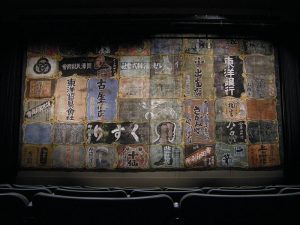妹「いや。聞こえる。絶対に鈴の音だ!」と呼ぶや、サッシを開け放った。その時、サンタはすでに玄関まで到達し、庭には誰もいなかった。
原成男「酒と涙と男と天ぷら」
More often than one might imagine, we encounter “sashes” (サッシ or サッシュ) being opened in contemporary Japanese. In cases like the one above, this does not refer to a strip of cloth worn around the waist (or even around curtains), but to a less common sense of “sash” in English: “a frame holding the glass in a window, typically one of two sliding frames.” (Oxford American Dictionary)
For those unfamiliar with this usage, consider “The Night Before Christmas”:
When out on the lawn there arose such a clatter,
I sprang from my bed to see what was the matter.
Away to the window I flew like a flash,
Tore open the shutters, and threw up the sash.
Note that the Kôjien lists サッシ (without the small “yu”) as only referring to the latter of the two meanings given above, while サッシュ can refer to either. Also note that this can refer to the frame of sliding glass doors as well, as in the image below.

Recent Comments